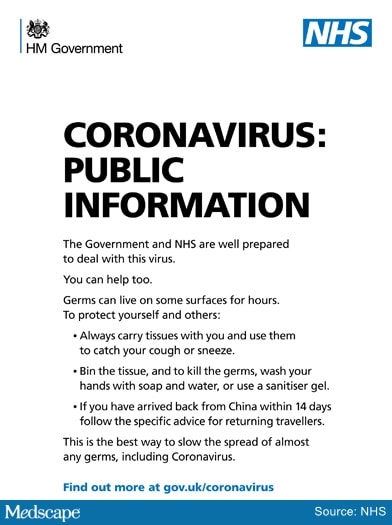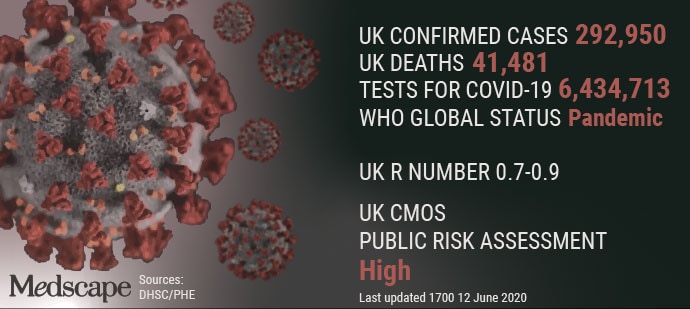A public health information campaign has been launched to advise people in the UK how to slow the spread of 2019 novel coronavirus (2019-nCoV).
The Department of Health and Social Care (DHSC) said the advice would reduce the potential impact on NHS services.
The publicity, which is similar to the 'Catch it, Bin it, Kill it' campaign used for flu and norovirus, was initiated after two people in England tested positive for 2019-nCoV.

It was confirmed over the weekend that one of the two individuals was a student at the University of York. The university authorities said the student had not been affected while on the campus.

UK Risk Raised From Low to Moderate
Following a declaration on the 30th January from the World Health Organisation that the virus posed a public health emergency of international concern, the UK's four chief medical officers raised the risk to the public from low to moderate.
In a joint statement, they said it was "prudent for our Governments to escalate planning and preparation in case of a more widespread outbreak".
They expressed confidence in the ability of health services throughout the UK to manage the likely scenario of individual cases in a manner that would protect the public and provide high quality care.
The UK was one of the first countries outside China to have a prototype specific laboratory test for the new disease.
Matt Hancock, Secretary of State for Health and Social Care, said: "Our highly trained and experienced clinicians are working round the clock to prevent the spread of coronavirus in the UK.
"The Government has detailed plans for how to deal with an outbreak like this. We can all play our part."
The UK-wide campaign advised the public to:
- Always carry tissues and use them to catch coughs and sneezes, and bin the tissue
- Wash hands with soap and water, or use sanitiser gel, to kill germs
Advice for Travellers From China
Specific advice was also included for anyone entering the UK in the last 14 days from Hubei province in China, including the capital Wuhan where the outbreak was first identified.
Regardless of whether they were experiencing symptoms of 2019-nCoV, those travellers were asked to:
- Stay indoors and avoid contact with other people, as they would in cases of flu
- Call NHS 111 to inform them of recent travel
- Call their GP if in Northern Ireland
Travellers to the UK from anywhere else in China, not including Macao or Hong Kong, who developed symptoms of cough, fever, or shortness of breath within 14 days of arrival should self-isolate and call NHS 111, the campaign advised.
Commenting on the public information campaign to the Science Media Centre, Dr John Tregoning, reader in respiratory infections at Imperial College London, said: "The infectious material spreads in the large droplets produced by coughs and sneezes. Therefore catching this material and safely disposing of it reduces the risk of further spread.
"Binning the tissue is important to get rid of any potentially infectious material.
"All viruses are susceptible to soap which breaks them down.
"All of the advice is standard advice to stop respiratory infections. The Government is stressing it now because the new coronavirus can spread between people and increased awareness can reduce the spread."
Dr Michael Head, senior research fellow in global health at the University of Southampton, added: "Although it won't protect specifically against coronavirus, one way people could help support health services is to ask their GP or pharmacy about the flu vaccine. Not only will this provide protection against the flu, but it will ease the burden on their local health services by reducing the number of presentations they see of respiratory infectious diseases, freeing up resources should any coronavirus cases be diagnosed."
Update on Coronavirus
In the latest update, the DHSC and Public Health England (PHE) said that, as of 3rd February, a total of 326 UK tests had been carried out for suspected 2019-nCoV, of which 264 were confirmed negative, and two were positive.
It said 1466 passengers and 95 crew had arrived in the UK on direct flights from Wuhan between 10th and 24th January. Of those, 162 of the passengers and 53 of the crew had already left the UK. Of the remainder, 866 were now outside of the incubation period.
PHE said it was working to contact the remaining individuals.
There have been more than 17,000 confirmed cases of 2019-nCoV in China. Latest figures showed that 361 people had died in the country.
Outside China, there have been more than 150 confirmed cases of the virus.
Over the weekend it was announced that one person infected with the virus had died in the Philippines.



